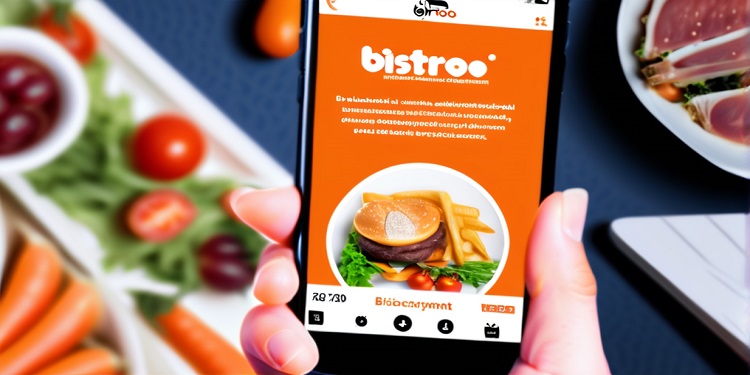In a significant development for real-world blockchain applications, Dutch food delivery platform Bistroo has entered the peaq ecosystem. This collaboration expands peaq’s reach by introducing over 100,000 existing Bistroo users, offering a new and decentralized alternative to established food delivery services such as Uber Eats and DoorDash. The partnership aims to leverage blockchain technology to address several challenges faced by restaurants and consumers using traditional delivery platforms.
The global food delivery market is projected to surpass $1.3 trillion by 2030, with established platforms like DoorDash and Lieferando maintaining strong footholds. However, the high commission fees charged by these services, often reaching up to 30%, have placed restaurants in a difficult situation. To counterbalance these fees, many restaurants are forced to raise prices on orders placed through such apps, which can frustrate customers. Yet opting out of these platforms risks losing a significant volume of orders and revenue, leaving restaurants with limited options.
Another major issue with Web2 delivery platforms is their failure to provide restaurants with meaningful data, incentives, or ownership structures that could help them grow. This lack of control over customer relationships makes it difficult for restaurants to foster long-term connections with their clientele, a critical factor for sustained business success.
Bistroo aims to change the current dynamic by eliminating intermediaries commonly found in Web2 platforms, thus reducing high fees and shifting power back to restaurants and customers. By facilitating direct connections between users and restaurants, Bistroo allows food establishments to reduce operational costs and, in turn, offer lower prices to their customers. The platform also features a unique program that eliminates transaction fees in exchange for a fixed monthly charge, making it more financially viable for restaurants to participate.
Bistroo users can also benefit from the platform’s focus on data privacy, with the option to opt out of data sharing or receive token rewards for choosing to share their information. Additionally, both restaurants and consumers can unlock further incentives using Bistroo’s native token, $BIST, which will serve as a reward mechanism within the ecosystem. As Bistroo expands globally, the $BIST token will facilitate lower service fees and additional rewards for contributing to the network.
Bistroo’s decentralized physical infrastructure network (DePIN) already operates in the Netherlands, where it charges restaurants only 5% in service fees, a fraction of the rates imposed by traditional platforms. Since July 2023, the platform has experienced a 200% user growth, amassing over 100,000 users. Building on this success, Bistroo plans to expand its services into Belgium and other regions. As it grows, Bistroo could introduce hundreds of thousands of new devices to the peaq ecosystem, significantly increasing the platform’s reach.
Transition from Ethereum to peaq
Bistroo, which previously operated on the Ethereum blockchain, is now transitioning to peaq, a layer-1 blockchain designed for decentralized applications and tokenized assets. The peaq ecosystem supports decentralized physical infrastructure (DePIN), which incentivizes individuals to crowdsource and build real-world infrastructure using blockchain technology. Bistroo is tapping into peaq’s Modular DePIN Functions and DePIN-friendly economics to expand its own ecosystem and scale operations more efficiently.
As part of this integration, Bistroo will migrate 25% of its token supply from Ethereum to peaq and establish the necessary infrastructure to facilitate this transition. The company plans to create a bridging smart contract and implement a staking mechanism on peaq to further engage users. In addition, Bistroo’s token-based loyalty program will now operate on peaq, offering rewards for reviews, referrals, and other contributions to the network.
Bistroo will also incorporate peaq IDs as its standard for user identity within its DePIN. This feature, combined with the platform’s rewards system, will enhance the user experience and incentivize greater participation from both restaurants and customers. Bistroo plans to develop a map of partner restaurants and integrate these features into its user-facing app. The company will also host an official token generation event on peaq, further solidifying its commitment to the platform.
The CEO of Bistroo emphasized that traditional Web2 delivery apps place a significant burden on restaurants through high fees and monetization of user data. Bistroo, by contrast, offers a more sustainable model that aligns with the interests of both restaurants and consumers. The partnership with peaq is expected to accelerate Bistroo’s growth by expanding its core features and reducing costs for both users and businesses.
The co-founder of peaq echoed these sentiments, pointing out that while online food ordering has become a daily routine, the Web2 model has created inefficiencies and financial strain on restaurants. Bistroo’s approach, enabled by peaq’s blockchain infrastructure, is designed to alleviate these burdens and create a more equitable ecosystem for all participants. Both companies view this partnership as a major step toward revolutionizing the food delivery industry by utilizing decentralized technologies to empower users and businesses alike.
As Bistroo continues its global expansion, the integration with peaq positions the platform to further disrupt the food delivery sector, offering a compelling alternative to traditional services. By combining blockchain technology with real-world commercial applications, Bistroo is setting the stage for a new era in food delivery that prioritizes fairness, transparency, and efficiency.
